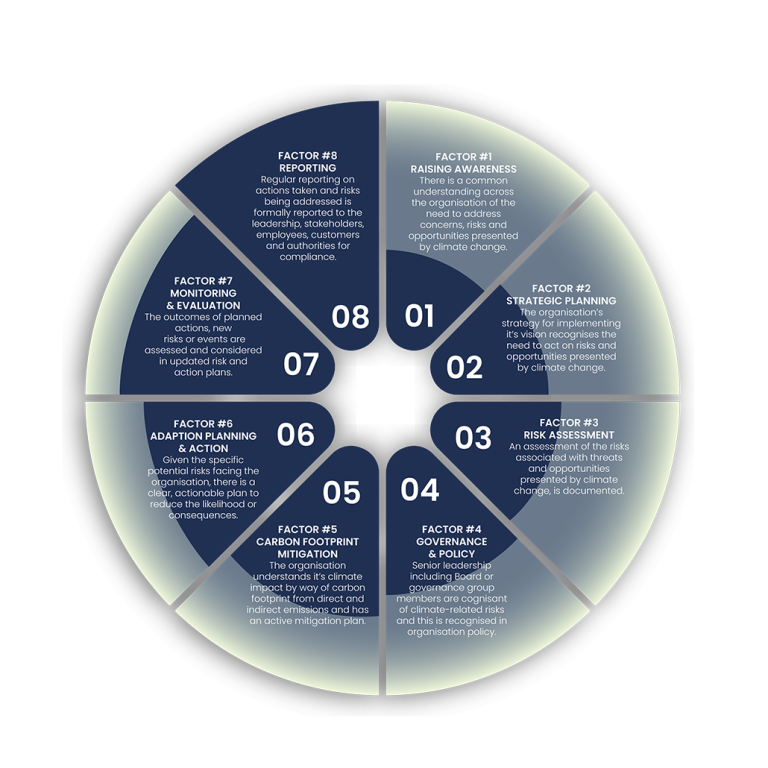8 Factors of Climate Readiness
The threats associated with climate change are not limited to any particular organisation type, size or geography although these elements will influence the level of risk. There are 8 Factors that are important for a comprehensive approach for preparedness.

As the world faces the growing challenges of climate change, there’s increasing pressure on businesses to clearly show how they’re managing the risks and opportunities it presents. Regulators, investors, and the broader community all expect transparency in this area.
After three rounds of consultation, the Australian government introduced mandatory climate reporting legislation in March 2024, which passed through Parliament in September. Starting 1 January 2025, the largest emitters and corporations will need to report on their climate-related risks and opportunities in a formal “Sustainability Report.” Smaller organisations will be phased in, with deadlines set for 1 July 2026 and 1 July 2027.
This move toward mandatory climate disclosures marks a major shift in corporate reporting – one of the biggest in a generation. Companies will need to dedicate focused effort and resources to navigate this new landscape. It’s important to start early and understand that the depth and quality of climate reporting will evolve over time.
Boards and Directors will play a key role in overseeing this transition, ensuring the organisation builds resilience in the face of both physical and transitional climate risks. The most successful companies will view mandatory climate reporting not just as a compliance task, but as an opportunity to show how they’re creating long-term value in a changing world.
A valuable resource for organisations that are required to report under the ASRS or are uncertain, is the Directors Guide for Mandatory Climate Reporting.
Introducing the 8 Factors of Climate Readiness
The threats associated with climate change are not limited to any particular organisation type, size or geography although these elements will influence the level of risks. There are eight factors, important for a comprehensive approach to preparedness. You should assess your organisation and consider if you are in ‘planning’, ‘underway’ or ‘complete/monitoring’ maturity phase for each factor. Whilst a set of tasks may be complete, each of these factors will be continually updated and hence monitored.
Raising awareness – There is a common understanding across the organisation of the need to address concerns, risks and opportunities presented by climate change.
Strategic planning – The organisation’s strategy for implementing it’s vision recognises the need to act on risks and opportunities presented by climate change.
Risk assessment – An assessment of the risks associated with threats and opportunities presented by climate change is documented.
Governance & policy – Senior leadership including Board or governance group members are cognisant of climate-related risks and this is recognised in organisation policy.
Carbon footprint mitigation – The organisation understands it’s climate impact by way of carbon footprint from direct and indirect emissions and has an active mitigation plan.
Adaption planning & action – Given the specific potential risks facing the organisation, there is a clear, actionable plan to reduce the likelihood or consequences.
Monitoring & evaluation – The outcomes of planned actions, new risks or events are assessed and considered in updated risk and action plans.
Reporting – Regular reporting on actions taken and risks being addressed is formally reported to the leadership as well to stakeholders, employees, customers and authorities for compliance, as is appropriate.
As climate change presents growing risks, businesses must prepare for mandatory climate reporting starting in 2025. With a focus on eight key factors – ranging from raising awareness to regular reporting – companies should assess their readiness to navigate both regulatory requirements and evolving climate risks. This is an opportunity to not only comply but to demonstrate resilience and long-term value.
Assess your Readiness
Complete the Climate Action Barometer survey today
and take a proactive step toward a sustainable, resilient future.

